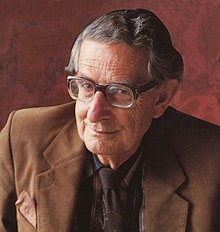Hans Jürgen Eysenck
| Hans Eysenck | |
|---|---|
 |
|
| Born | Hans Jürgen Eysenck 4 March 1916 Berlin, German Empire |
| Died | 4 September 1997 (aged 81) London, England |
| Citizenship | British |
| Nationality | German |
| Fields | Psychology |
| Institutions |
Institute of Psychiatry King's College London |
| Alma mater | University College London (UCL) |
| Doctoral advisor | Cyril Burt |
| Doctoral students | Peter L. Broadhurst, Jeffrey Alan Gray, Donald Prell |
| Known for |
intelligence, personality, Eysenck Personality Questionnaire, differential psychology, education, psychiatry, behaviour therapy |
Hans Jürgen Eysenck, PhD, DSc (/ˈaɪzɛŋk/; 4 March 1916 – 4 September 1997) was a German-born psychologist who spent his professional career in Great Britain. He is best remembered for his work on intelligence and personality, though he worked in a wide range of areas within psychology. At the time of his death, Eysenck was the living psychologist most frequently cited in the peer-reviewed scientific journal literature.
Eysenck was born in Berlin, Germany. His mother was Silesian-born film star Helga Molander, and his father, Eduard Anton Eysenck, was a nightclub entertainer who was once voted "handsomest man on the Baltic coast". (pp. 8–11). His mother was Lutheran and father Catholic. Eysenck was brought up by his maternal grandmother. (His grandmother was a fervent Lutheran, but after she died in a concentration camp, Eysenck ascertained that she had come from a Jewish family.) (p. 80). An initial move to England in the 1930s became permanent because of his opposition to the Nazi party. "My hatred of Hitler and the Nazis, and all they stood for, was so overwhelming that no argument could counter it." (p. 40) Because of his German citizenship, he was initially unable to gain employment, and was almost interned during the war. He received his PhD in 1940 from University College London (UCL) working in the Department of Psychology under the supervision of Professor Sir Cyril Burt, with whom he had a tumultuous professional relationship throughout his working life. (pp. 118–119).
Eysenck was Professor of Psychology at the Institute of Psychiatry, King's College London, from 1955 to 1983. He was a major contributor to the modern scientific theory of personality and a brilliant teacher who helped found treatment for mental illnesses. Eysenck also created and developed a distinctive dimensional model of personality structure based on empirical factor-analytic research, attempting to anchor these factors in biogenetic variation. In 1981, Eysenck became a founding member of the World Cultural Council. He was the founding editor of the international journal Personality and Individual Differences, and wrote about 80 books and more than 1600 journal articles. His son Michael Eysenck is also a noted psychology professor. Hans Eysenck died of a brain tumour in a London hospice in 1997. He was an atheist.
...
Wikipedia
